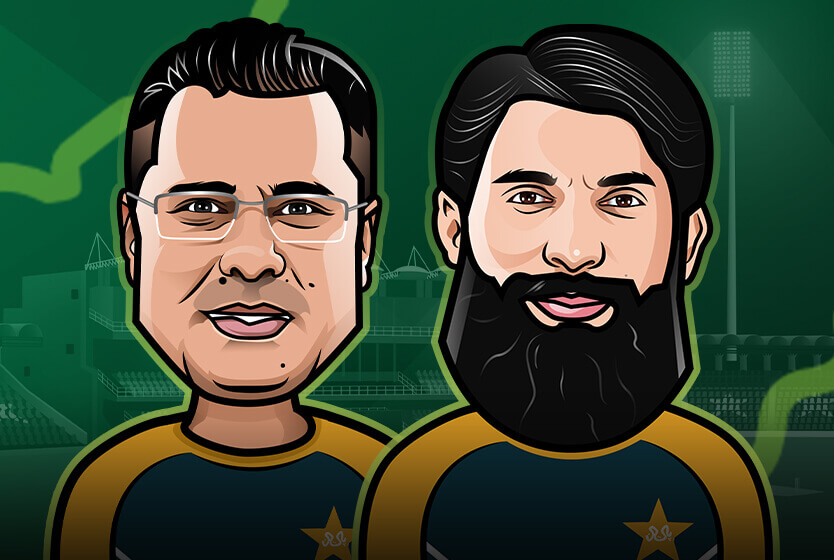
From Waqar Younis to Mickey Arthur to Misbah-ul-Haq – The Story of Pakistan’s Last 3 Head Coaches
Misbah-ul-Haq recently stepped down as Head Coach with one year remaining on his contract.
With Misbah-ul-Haq and Waqar Younis stepping down from their positions as head coach and bowling coach of the national team, yet another managerial-level shake-up in the men’s side is now extant. While the resignations were a shocking development considering there is a mega-event looming just around the corner and the fact that both coaches had a year left in their respective contracts, it is not the first time something of this sort has materialized out of thin air as far as Pakistan cricket is concerned.
Contrary to popular opinion, however, the previous three head-coaching stints had been fairly stable in the sense that all of them lasted more than 18 months. More importantly, unlike during the 2007-2012 period where numerous on-field and off-field controversies soured the coaches-players relations and led to groupings within the team, the post-2014 period has been much more cricket-oriented in that regard. In this article, we take a look at the tenures of Waqar, Mickey Arthur, and Misbah as the three most recent head coaches of Pakistan and discern how they have fared in their roles, both from an isolated and a comparative perspective.
Waqar was appointed head coach of Pakistan for the second time in May 2014 after having served in the same capacity earlier from 2010 to 2011. He succeeded Moin Khan, who was separated from his position as an interim coach after the national team’s poor showing in the World T20 2014. The former speedster’s immediate assignment as the head coach was the bumper Test season in 2014, followed by the World Cup in Australia and New Zealand in early 2015.
Despite an early setback in the tour of Sri Lanka, where Pakistan lost both the Test and ODI series, Waqar got Pakistan back to winning ways in red-ball cricket. Together with the now established captain, Misbah-ul-Haq, Waqar formed a formidable partnership as Pakistan overwhelmed Australia and England in their adopted home in the Emirates and shared honors with New Zealand. Following the 2-0 series defeat in Sri Lanka, Waqar only lost two more Test matches in his stint that lasted till April 2016 and also managed to set his record straight in Sri Lanka with a series victory in 2015. It was during this time that Pakistan rose to the No. 2 spot in ICC Test rankings for the first time since 2006.
The Pakistan fast-bowling legend, however, couldn’t reverse the team’s fortunes in limited-overs cricket. During his tenure, Pakistan lost comprehensively both at home and in foreign conditions. The team’s record, in particular at home, was abysmal, both in ODIs and T20Is. Non-Asian countries like Australia, New Zealand, and England dominated Pakistan in UAE throughout this two-year period, as depicted in the table below. Pakistan’s dreadful run of form in white-ball cricket reflected in their campaigns during global events. They weren’t particularly impressive in Asia Cup 2016 and crashed out of World T20 2016 with hardly anything to show. It was weeks after Pakistan’s humiliating exit from the mega-event that Waqar submitted his resignation.
The position vacated by Waqar was occupied by Mickey in May 2016. The South African-born had international coaching experience with South Africa and Australia before he joined the Asian side. He had also mentored several franchises in domestic cricket competitions. After becoming only the fifth overseas head coach in the Pakistan cricket team’s history, Mickey’s first mission was to adequately prepare the team for a summer-long tour of the United Kingdom.
With Misbah at the helm, Pakistan did fairly well in the four-match Test series against a full-strength English side. In the fourth Test, Pakistan leveled the series to be crowned the No. 1 Test team in the world. Although it was under Mickey’s coaching tenure that Pakistan got hold of the illustrious Test mace, it was, of course, more credited to his predecessors. Under Mickey, Pakistan did have their moment of glory in red-ball cricket when they won their first-ever Test series on Caribbean soil in 2017 and bid farewell to Younis Khan and Misbah in the grandest manner.
It was, however, in white-ball formats that Mickey had the greatest impact. A team that was lost for direction and was spiraling downwards in an ever-wavering world of modern ODI cricket, Mickey helped them bag their biggest achievement of the decade. Despite being the nethermost-ranked side in the Champions Trophy 2017, Pakistan triumphed – trampling over arch-nemeses, India, to lift the silverware. While Pakistan recalibrated their ODI objectives, Mickey helped them rejuvenate their T20I fortunes, too. Through his headmasterly style of coaching with strict fitness standards in place, Mickey stringed together a T20I squad that went on a winning spree, as depicted in the whole array of green cells in the table below. Pakistan won 11 series on the trot and climbed atop of the ICC T20I rankings.
Things began to fall apart for Mickey in the latter half of 2018, where Pakistan not only suffered a home Test series defeat against New Zealand but were also whitewashed by Australia in an ODI series in UAE. The once Champions Trophy winners and the No. 1 ranked Test and T20I side plunged into an abyss. The contracts of Mickey and the entire coaching staff were not renewed after the World Cup in 2019 as Pakistan decided to turn the corner with newer faces.
Misbah replaced Mickey and signed a three-year contract in September 2019. This was Misbah’s first stint as an international team’s coach after having retired from the game only in 2017. But the former captain had plenty of relevant leadership experience and had played a lot with several players who were representing Pakistan in different formats at that time.
Misbah helped steady Pakistan’s red-ball ship that had been sailing on dangerous territories for a while. Although Pakistan didn’t win a single Test in SENA countries during Misbah’s stint as head coach, he ensured that they didn’t lose a game at their home, too. In ODIs, too, Pakistan only lost two of their six matches leading to the recent tour of England where they were humiliated by a second-string English side and were beaten all ends up throughout the three-match series.
Similarly, in T20Is, Pakistan had begun to find shades of their long-lost form. Since 2020, Pakistan had won six of their nine T20I series and drawn one. Misbah is, in fact, the only coach amongst the three to have a win-loss ratio of over +1 across formats. But just when he was beginning to settle affairs and ruminate over a long journey ahead, he has called it quits from his coaching role just over a month from the commencement of the World T20 2021.
We now try to draw comparisons between the tenures of the three head coaches, dissecting how Pakistan have fared under each of them across formats. As established above, Pakistan weren’t particularly impressive during Mickey’s reign in Tests at home. Two reasons Pakistan had such a high winning percentage (80.0%) during Misbah’s tenure could be that Pakistan played all Tests in their actual home and the fact that some of the oppositions were not as competitive as they used to be in the past. There is a continuous progression towards betterment in ODI cricket from Waqar to Misbah while on the T20I front, things were blooming under Misbah but were surely not as glorious as they were during the unimaginable run-of-form under Mickey.
In Tests away from home, Pakistan have consistently slumped since reaching the pinnacle in 2016. A win percentage of 42.9% during Waqar’s stint is decent, but his successors did not manage to better it. Pakistan have generally struggled in away ODIs under all three coaches, with none of them having a win percentage over 40.0% in fifty-over games on foreign shores. As for T20Is, Pakistan won almost 70% (11 out of 16) of their away duels when Mickey was in charge, which is as remarkable as it gets. During Misbah’s tenure, this win percentage dropped to half of its original value.
If we now take a glimpse at the overall win-loss ratios of the three coaches across formats, we can observe that all three of them had differing impacts on the team from different angles. While Misbah appears to be the one who has the most balanced record sheet across formats, Waqar has the most prominent role in revitalizing Pakistan’s Test side amongst the three since 2014, and Mickey’s influence on upgrading Pakistan’s T20I standards is simply unparalleled.
Pakistan may well be the toughest sporting team to coach. Still, numbers suggest that if you look to instill stability and hone a culture within a team, then your odds of coming across a glittering achievement within an expanse of ‘mixed results’ can increase.


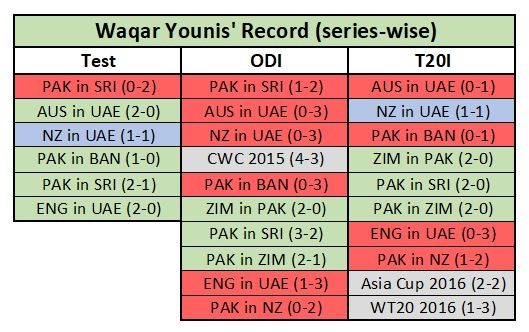

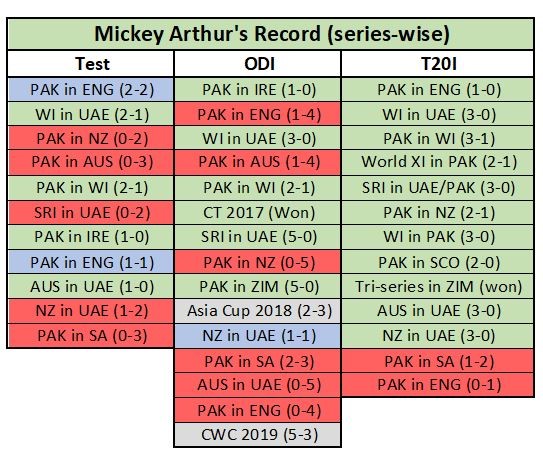


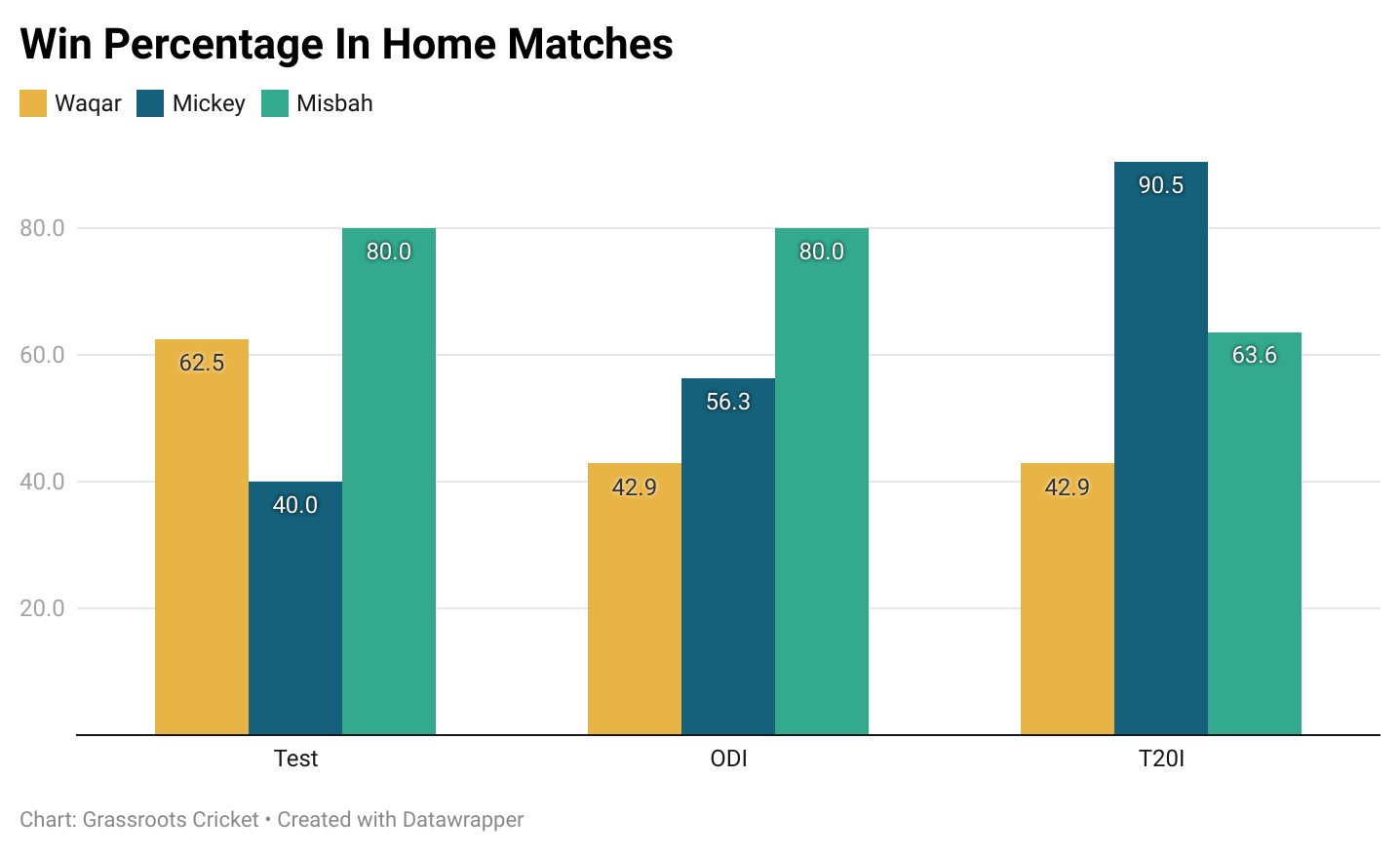

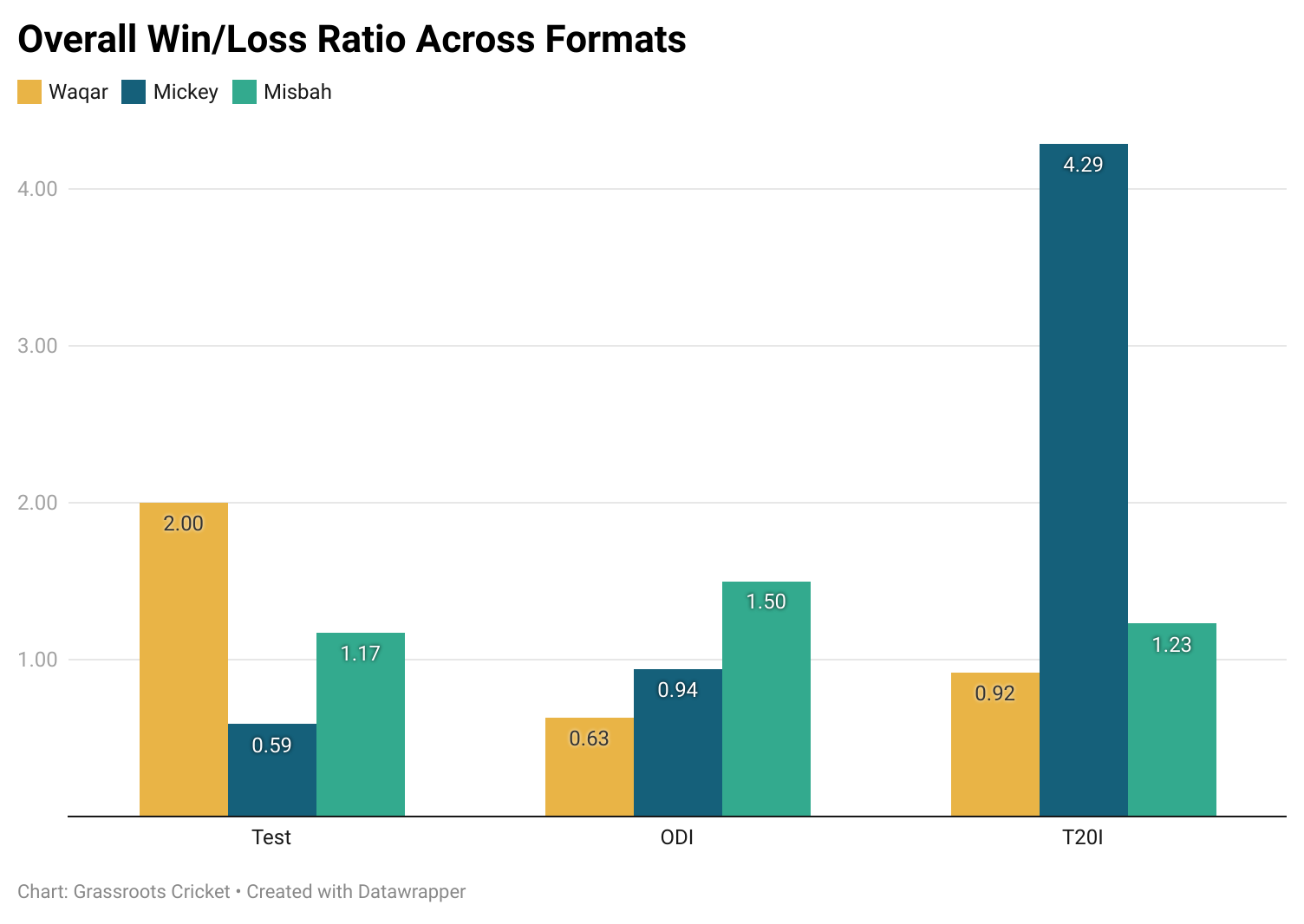
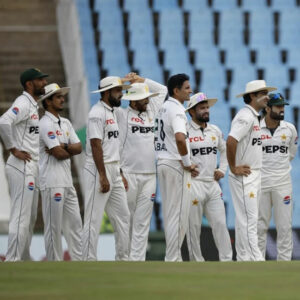
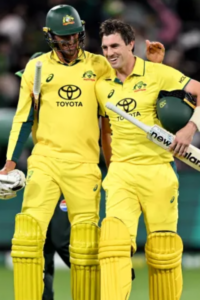
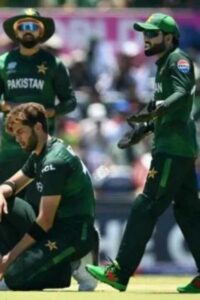
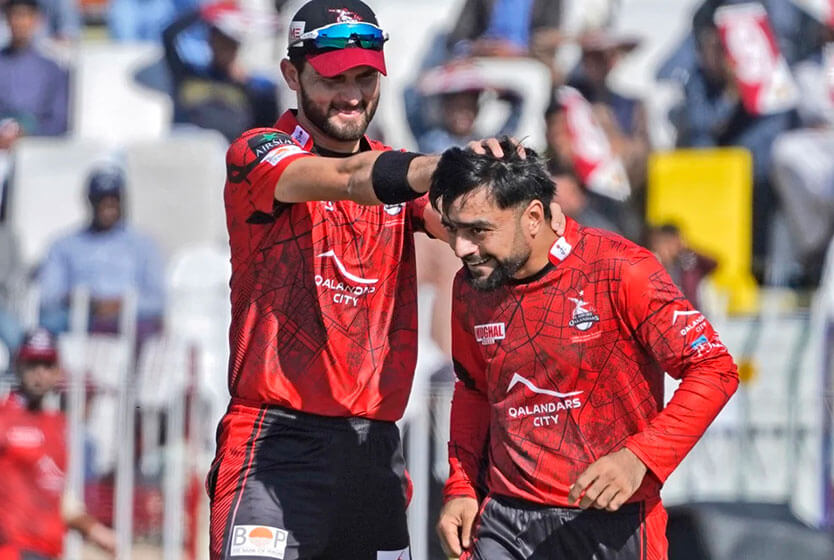
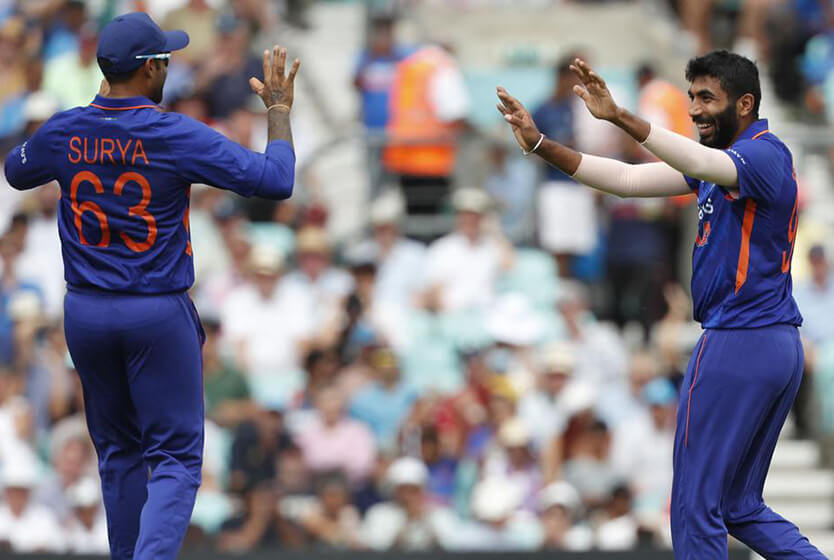
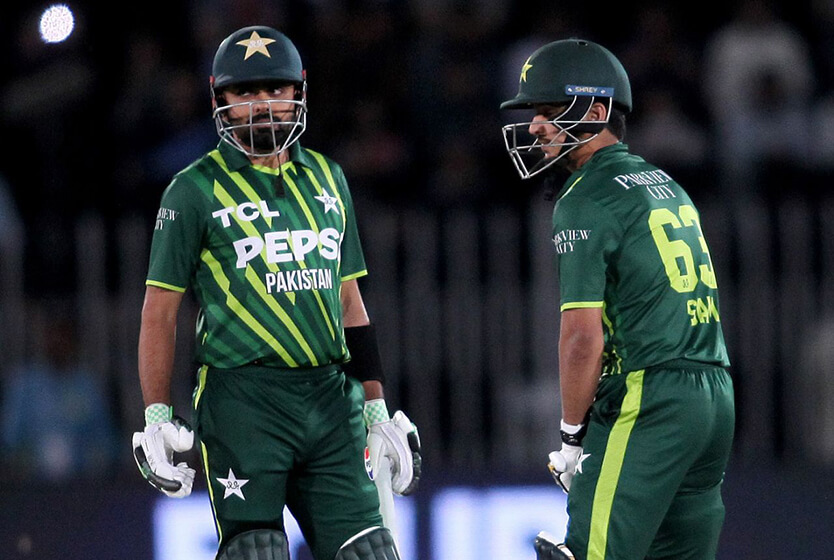
Leave a Reply